Shanghai surprise: How I survived the world’s strictest Covid lockdown
Shanghai, China
CNN
—
When I left a Covid-ravaged Hong Kong, I was in search of a sanctuary.
It was early March and the city was in the throes of the biggest coronavirus outbreak per capita in the world.
Little could I have known as I boarded the plane that my cunning escape plan would take me from the frying pan into the fire; that as I landed in Shanghai I would be swapping the world’s biggest outbreak for the “world’s strictest lockdown” – and 70 days of enforced confinement.
Still less could I have foreseen that, after serving three weeks of government-mandated quarantine on arrival, my housing compound would be hermetically sealed for a further 49 days straight, or that my mom and I would catch Covid, or that I would be carted off for a further spell of isolation at one of the government’s notorious “fangcang” camps.
And if you’d told me then that it would be under the glaring strip lights of one of those “fangcang” camps, amid the whiff of dubious makeshift toilets and the dirty laundry of thousands of strangers, that I would have an epiphany about the joys of communal living and the mental health benefits of enforced breaks, well … then I probably wouldn’t have believed you.
But let me back up and explain.
At the time I boarded the plane, the siren song of Shanghai – my hometown – seemed hard to resist.
In Hong Kong, Omicron was running amok, but in Shanghai cases were still in the single digits and with China’s iron-fisted approach to infections it seemed reasonable to think things would stay that way.
That was my first mistake.
During my three-week quarantine on arrival, I watched in horror as the cases exploded.
And the longer I stayed inside, the higher the cases climbed.
By the time I was finally allowed out, I had one fleeting day of freedom then was forced back inside for a lockdown that would supposedly last just four days.
Nothing to worry about, I thought.
That was my second mistake.
In fact, the residential compound where I was staying with my parents was about to be sealed off for the best part of two months as the virus worked its way through its 21 stories and 300 inhabitants.
Covid could seemingly pass between the floors and walls and the realization even the strongest measures couldn’t stop it was terrifying and shocking. Each time a single person tested positive, the lockdown was extended another 14 days.
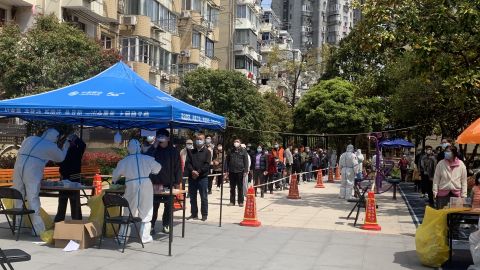
Many of us responded by becoming model Chinese citizens, volunteering to disinfect the estate and help distribute food and essential goods – all of which had to be delivered – directly to people’s doors.
And the volunteers sanitized with a vengeance, lugging around 30-kilogram (66-pound) tubs of chemicals and donning full hazmat suits to douse in disinfectant every incoming package, every nook and cranny.
By the time they had finished, the building was so awash with chemicals that some of my neighbors’ touchscreen electronic door locks had corroded and stopped working.
This might have helped ease people’s nerves, but there’s little evidence it did anything to stop the virus spreading.
Twenty-four days into the lockdown, my mom — who like my dad and I had not set foot outside the apartment except for a mandatory test – saw the dreaded double line in her daily self-administered antigen test.
I waved goodbye to mom as the government workers hauled her off to one of the 288 schools that had been converted into isolation sites. The next day, I found I too had been infected.
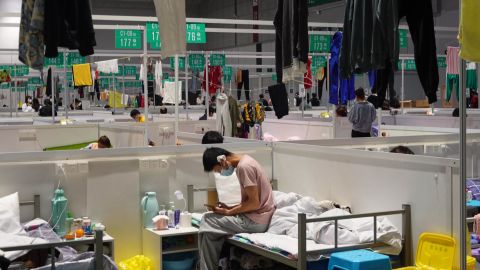
Any hopes of seeing mom again were soon dashed as people were randomly assigned to different sites. I was bused to the National Exhibition and Conference Center, Shanghai’s largest quarantine facility – nicknamed the “lucky clover” due to its shape.
Once host to the world’s biggest auto show, it was converted into a makeshift Covid hospital with 50,000 beds, one of many public venues to have been repurposed into what Chinese refer to as “fangcang”.
Fangcang date back to the original Covid outbreak in Wuhan and are widely viewed by Chinese as a success story.
Somehow though, my arrival felt less than auspicious.
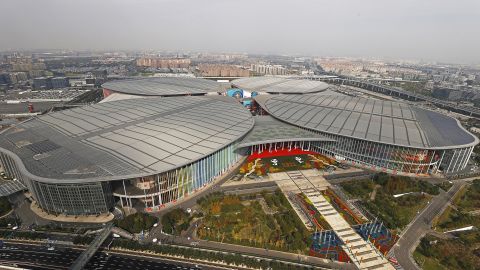
The second I stepped into my designated hall – one half of a leaf of the four-leaf “lucky clover” – I was overwhelmed.
A sea of what looked like oversized baby cots and laundry hanging from the rafters stretched before my eyes.
“Welcome to the jungle,” I thought, as hoards of strangers dressed in their pajamas hustled and bustled around me, made all the scarier by my mental state, which had deteriorated from a lack of social interaction.
A nurse assigned me a cot, the previous occupant of which had kindly left behind a large yellow bag marked “medical waste.” Then I was handed a bag of my own, containing bedding, a plastic basin and a cup for washing, a toothbrush, toothpaste, towel and slippers.
It was only later that I discovered the true horror lurking behind the “lucky clover”: the toilets.
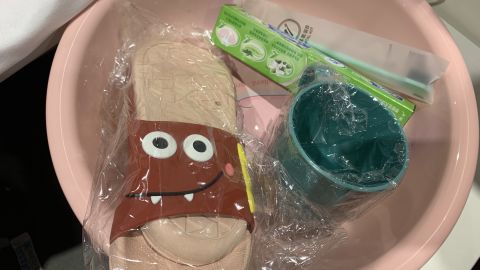
It is hard to describe the odor that results from thousands of people depending on dozens of portable squat toilets day after day.
Let’s just say that every visit to the washroom – a shady, stinking area covered by a giant tent on the edge of the clover – was a test of courage.
The constant booming of the plumbing system lent every visit a sinister feel. When you approached there would be long, snaking queues of people with tissue paper wrapped around their hands, all gingerly inspecting toilet cabin after cabin in doomed attempts to find one that might be hygienically acceptable.
It wasn’t the cleaning staff’s fault – simply the volume of people. The toilets would soil and the tissue bins fill and overflow far sooner than the staff could get to them.
The floor was always wet, which made balancing while squatting harder – especially as the cabin locks rarely worked, meaning one hand needed to be dedicated to fending off unwanted intruders.
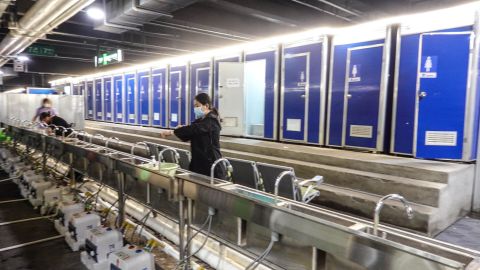
Unfortunately, given the many gallons of water I was forcing down my throat in an effort to flush out the virus, I spent far more time here than I would have liked.
Then there was the problem of trying to sleep in a place where there is no darkness. Rows of ceiling lights stayed on throughout the night, so I took to wearing two face masks – one for my mouth and nose and one for my eyes.
Others struggled with the noise; the sound of thousands of people snoring, grinding their teeth, tossing and turning and groaning and grunting in their sleep gave this the feel of a safari.
That first night, it took me hours to fall asleep, only to be woken what felt like moments later by a loudspeaker blasting “please come take the PCR test” – at 6:00 am.
The lack of sleep was making things seem weird, but things were about to get weirder still.
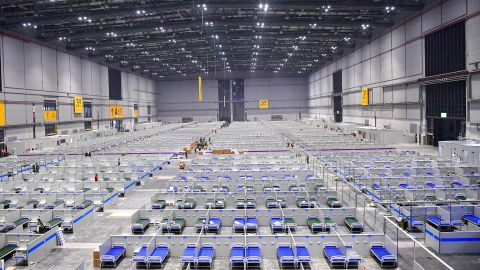
I was in an enormous room with 3,000 strangers, and I felt all alone. All I had was a tiny cot, a corner, a cabinet and a stool. The intense overhead lights left me feeling sterile, cold and exposed. It felt like a hospital, a bazaar and a maze all rolled into one.
That’s when something deep inside me stirred: memories of the communal living experiences I’d had as a child growing up in China.
As part of the state curriculum, city kids like me had been sent to countryside camps to learn how to farm and work on assembly lines. Part of the experience was sleeping on large, undivided platforms with little privacy. The living conditions were poor, but any discomfort was outweighed by the youthful excitement of having a sleepover with classmates.
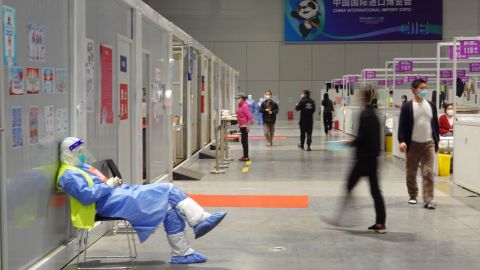
My feelings of awkwardness in the “lucky clover” fell away. What I once viewed as embarrassingly intimate now felt like a pajama party.
Most people were just minding their own business, and something not entirely unlike “normal life” was continuing. People lounged on their cots, making calls with friends and family,…
Read More: Shanghai surprise: How I survived the world’s strictest Covid lockdown

